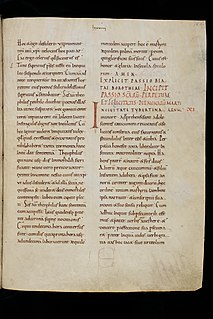
The Passion of Saints Perpetua and Felicity is a diary by Vibia Perpetua describing her imprisonment as a Christian in 203, completed after her death by a redactor. It is one of the oldest and most notable early Christian texts.
Saint Simeon, Saint Symeon or Saint-Siméon may refer to:
Theodora is a given name of Greek origin, meaning "God's gift".

Santa Felicita is a Roman Catholic church in Florence, region of Tuscany, Italy, probably the oldest in the city after San Lorenzo. In the 2nd century, Syrian Greek merchants settled in the area south of the Arno and are thought to have brought Christianity to the region. The first church on the site was probably built in the late 4th century or early 5th century and was dedicated to Saint Felicity of Rome. A new church was built in the 11th century and the current church largely dates from 1736–1739, under design by Ferdinando Ruggieri, who turned it into a one nave edifice. The monastery was suppressed under the Napoleonic occupation of 1808–1810.

July 9 - Eastern Orthodox Church calendar - July 11
Saint Saturninus may refer to:
Felec or Felix was an obscure 5th- or 6th-century British saint active in Cornwall. The church of St Felicitas and St Piala's Church, Phillack near Hayle is dedicated to Saint Felec. Later generations mistook him for the female Saint Felicity of Rome.
Saints Marius, Martha, Audifax, and Abachum were, according to their largely legendary passio of the 6th century, four saints of the same family. They came from Persia to Rome, and were martyred in 270 for sympathizing with Christian martyrs and burying their bodies. Some ancient martyrologies place the date of their death between 268 and 270, during the reign of Claudius II, although there was no persecution of Christians during this time.

January 31 - Eastern Orthodox liturgical calendar - February 2
Saint Vitalis may refer to:

Symphorosa is venerated as a saint of the Catholic Church. According to tradition, she was martyred with her seven sons at Tibur toward the end of the reign of the Roman Emperor Hadrian (117–38).
Saint Alexander may refer to one of several saints including:

Felicitas of Rome, also anglicized as Felicity, is a saint numbered among the Christian martyrs. Apart from her name, the only thing known for certain about this martyr is that she was buried in the Cemetery of Maximus, on the Via Salaria on a 23 November. However, a legend presents her as the mother of the seven martyrs whose feast is celebrated on 10 July. The Eastern Orthodox Church celebrates their martyrdom on 25 January.
Saint Felicity may refer to:

Felicity is a female given name of English origin meaning "happiness". It is derived from the Latin word felicitas meaning "luck, good fortune". It is also used as a form of the Latin name Felicitas, taken from the name of the Ancient Roman goddess Fortuna. It was also the name of Saint Felicity of Rome, a 2nd-century saint venerated by the Roman Catholic Church. Felicia, a related name, is a feminine form of the name Felix, which is derived from an Ancient Roman cognomen meaning "lucky," or "successful." Its diminutive is Flick.
Quintian or Quintianus (Latin), from Quintus, is a male given name meaning "the fifth" and may refer to:

March 6 - Eastern Orthodox liturgical calendar - March 8

Perpetua and Felicity were Christian martyrs of the 3rd century. Vibia Perpetua was a recently married, well-educated noblewoman, said to have been 22 years old at the time of her death, and mother of an infant son she was nursing. Felicity, an enslaved woman imprisoned with her and pregnant at the time, was martyred with her. They were put to death along with others at Carthage in the area of Africa in the Roman province of Africa.
This page is based on this
Wikipedia article Text is available under the
CC BY-SA 4.0 license; additional terms may apply.
Images, videos and audio are available under their respective licenses.





